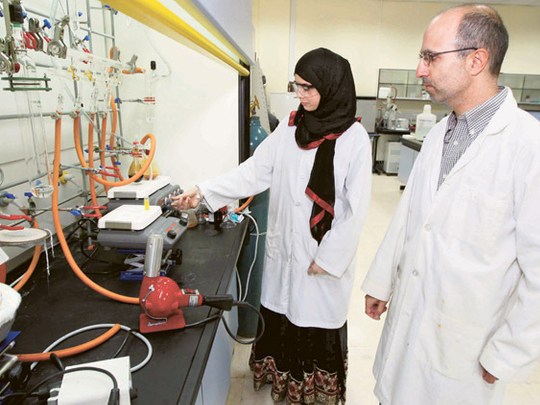
Dubai: Gold, silver and platinum have been found to be the most effective compounds to decontaminate water supplies from harmful pesticides used in agriculture.
Dr Sofian Kanan, Associate professor of chemistry, and Maham Khalil, environmental sciences graduate at the American University of Sharjah (AUS) made the discovery during the development of a catalyst compound.
The pair was recently recognised for their research study at the annual AUS student research awards competition sponsored by British Petroleum and Sharjah Islamic Bank.
Dr Kanan's research study called: The Photodecomposition of Naptalam in the presence of various catalytic systems is aimed at developing effective catalysts to quickly break down pesticides in the environment.
"Part of my research interest is to eliminate pollutants from the environment and water supply," said Dr Kanan. "Population growth and increased demand for agricultural food has meant pesticide application has risen significantly across the world."
The study has received a two-year research grant of Dh130,000 from the Emirates Foundation. However, the economic viability of using the compounds of such precious metals has yet to be addressed.
Dr Kanan added that due to the increased spraying of pesticides, soil, ground water and seas have been affected. "Once sprayed with pesticides, the plant or crop will take the minimum amount it requires then the rest is released into the ground water or the sea."
However, water contamination from pesticide spraying is not a serious problem in the UAE as it is not an industrially aggressive agricultural nation.
The catalyst
The research entails the development of a catalyst compound aimed at decomposing common pesticide solutions such as carbamate found in water at an accelerated rate.
"Pesticides have a life span of 30 days I have now been able to develop a compound that can get rid of it in 30 minutes," said Dr Kanan. "The idea of the catalyst is to speed up the breakdown of pesticides into smaller non-harmful species."
He added that the experiments are being conducted in an environment with larger concentrations of pesticides than those found in normal water volumes to ensure accuracy of the findings.
Dr Kanan has discovered, with the help of Khalil, a modified material containing compounds of gold, silver and platinum which have been most effective in decomposing the pesticide.
This translates into safer water consumption for the population when filters are put on taps.
"The water would come to your house and by adding a water filter it would absorb the remaining organic species," he said.
"Through the use of a modified material found in solid powder form anything in the water will be sucked into the filter which acts as an absorbent [material]."












